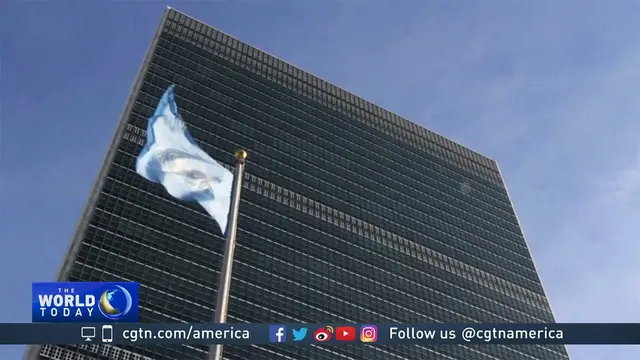Months of anti-government protests have rocked Venezuela, and there's growing concern that the UN is not adequately addressing the situation.
(A woman raises her arms as a surrender signal to a lineup of Venezuelan Bolivarian National Guards soldiers outside of Military base Paramacay in Valencia, Venezuela, Sunday, Aug. 6, 2017. /AP Photo)
Last month, diplomat Isaias Medina resigned from his post at the Venezuelan mission in New York, saying he could no longer support the actions of his government.
"I felt that what Maduro's regime is doing is contrary to the principles of the United Nations charter," Medina said. "It would be incoherent to keep working in such an institution of international and multilateral fore, that I respect so much, and it would be hypocritical."
The Venezuelan mission declined to comment.
(Venezuela's President Nicolas Maduro (C) speaks during a meeting with supporters in Caracas, Venezuela, July 30, 2017. /Reuters Photo)
Following last weekend's vote on the new National Constituent Assembly, the Secretary General expressed concern about unrest, saying political negotiations are urgently needed. The UN High Commissioner for Human Rights has also urged peace, calling for peaceful protests and calm.
An NGO based in Geneva that monitors the UN for accountability, however, feels action and not just words is needed.
"They should meet now in emergency session, because, among other things, Venezuela is one of their members. And as a member state, you are obliged to," UN Watch’s Hillel Neuer said. “You have an extra obligation to promote human rights.”
The UN Security Council has spoken about Venezuela only once, almost two months ago. The topic did not have a scheduled session of its own but was instead squeezed into another session.
According to some, the unrest in Venezuela is another example of the Security Council’s struggle to agree when asked to judge conflict within countries.
"Venezuela is a microcosm for a larger conflict where the United States and its global liberal order propose intervention to uphold liberal values of democracy. And other states like Russia and China pursue a more sovereign’s approach of non-intervention,” according to New York University’s Michael John Williams.
With member countries stymied by geopolitics divisions, calls for action rather than action itself, may be the best the UN can achieve.
 简体中文
简体中文

